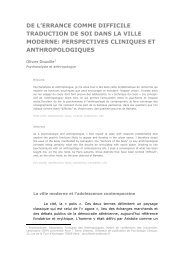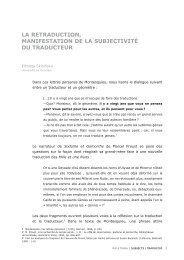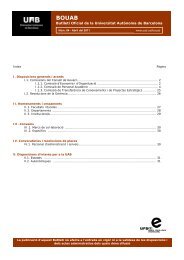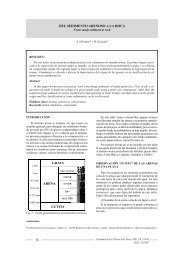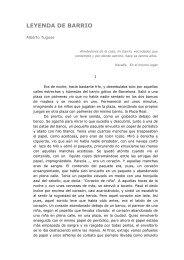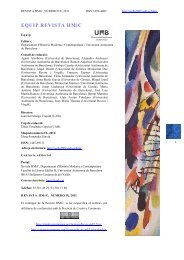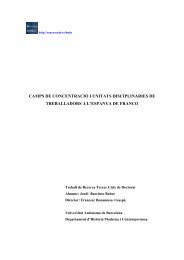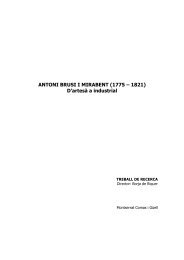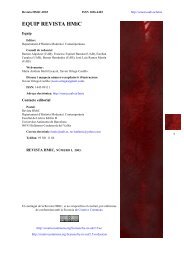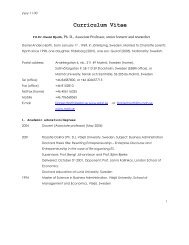EQUIP REVISTA HMiC - Universitat Autònoma de Barcelona
EQUIP REVISTA HMiC - Universitat Autònoma de Barcelona
EQUIP REVISTA HMiC - Universitat Autònoma de Barcelona
You also want an ePaper? Increase the reach of your titles
YUMPU automatically turns print PDFs into web optimized ePapers that Google loves.
Marginalization Insi<strong>de</strong>-Out:Thoughts on Contemporary Chinese and Sinophone Literature<br />
However, although the transnational flux of economic capital may be re-shaping the<br />
boundaries between China and the West, and within China itself, and although this new context<br />
is changing the economic production of the literary works (as it is exemplified in the last<br />
quotation) the cross-cultural exchange, the flux of symbolic and cultural capital seems to remain<br />
unidirectional. As Andrew F. Jones already claimed more than a <strong>de</strong>ca<strong>de</strong> ago: “it is essential that<br />
we break that vicious circuit, (...) that we begin to envision ways in which we might promote<br />
dialogue and even ‘communal action’ directed against the perpetuation of a system mired in<br />
unidirectionality.” 43 This one-way road leads to a cul-<strong>de</strong>-sac when we try to find out specific<br />
answers, especially in the tangible and materialistic domain of the cultural industry: “I can only<br />
suggest just how intractable these problems remain, especially in the context of the publishing<br />
industry.” 44<br />
The suitable tactics of intervention should reserve a crucial role for the translator and the<br />
critic—both Chinese and Western—specialized in the contemporary Chinese field. His or her<br />
mission, not only as cultural mediator, but also, in Jones’s terms, as “entrepreneur, a “go<br />
between” who must successfully market a product to the target audience” should be absolutely<br />
essential, 45 even more so given the restrictive and commercially biased politics of the<br />
publishing industry. Unfortunately, this is not the case in the current context. It would be highly<br />
beneficial if the professional and ethical commitment of the translator as mediator could directly<br />
influence the divulgation and promotion of Chinese writers whose works can fracture the canon<br />
by using literary weapons such as sophisticated techniques, experimental structures or<br />
unatten<strong>de</strong>d themes. 46 It is probably a question of finding a balance between the adaptation or<br />
a<strong>de</strong>quateness to the Western canon and, at the same time, a strong <strong>de</strong>gree of what in translation<br />
theory has been known as foreignization—already suggested by Friedrich Schleiermacher in the<br />
early nineteenth century as one of the two ways of translation (the other one being<br />
domestication) and, more recently reworked by Lawrence Venuti, among others. 47<br />
In this attempt of balancing domestication and foreignization and being aware of the<br />
insidious ways in which the literary market works, Sinophone literature could perhaps be<br />
tactically interesting in or<strong>de</strong>r to win the appetite of the international rea<strong>de</strong>rship. On the one<br />
hand, on a conceptual basis: as a way to break the stereotypical, monolithic vision of Chinese<br />
literature from the West. On the other hand, on a more pragmatic basis: given the historical and<br />
socio-economic background embed<strong>de</strong>d in the Taiwanese works, for example—especially visà-vis<br />
the works from the PRC—they could present a context more accessible for the Western<br />
rea<strong>de</strong>r, in which he would probably find more complicities and i<strong>de</strong>ntifications—assuming the<br />
43. Jones, “Chinese Literature in the ‘World’ Literary Economy”: 189.<br />
44. Ibid., 188.<br />
45. See: Jones, “Chinese Literature in the ‘World’ Literary Economy”: 183.<br />
46. Writers like, for instance, Ge Fei (b. 1964), Can Xue (b. 1953), Chu Tien-wen (b. 1956) or Wang Chenho<br />
(1940-1990), would certainly fall apart the expectations that the Catalan and Spanish audience has<br />
for Chinese literature. The possibility of cultural misun<strong>de</strong>rstandings in these works would always be<br />
present, but, in my opinion, is still more remarkable in the works of Su Tong (b. 1963), Yu Hua (b.<br />
1960), Mo Yan (b. 1956) and Wang Shuo (b. 1958), which would nevertheless be suitable for<br />
promotion as well.<br />
47. See: Schleiermacher, Friedrich, “On the Different Methods of Translating,” in Robinson, Douglas, ed.,<br />
Western Translation Theory from Herodotus to Nietzsche. Manchester: St. Jerome Publishing, 1997<br />
(1813), 225-238; and Venuti, Lawrence, The Translator’s Invisibility. A History of Translation. London<br />
and New York: Routledge, 1995.<br />
http://seneca.uab.es/hmic Revista <strong>HMiC</strong>, número IV, 2006<br />
50



